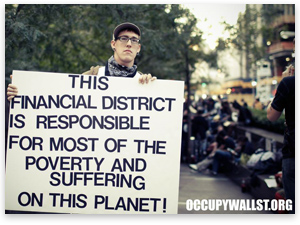From what I can decipher of the hodge podge of videos and crayoned signs, the chief complaint of the "occupy" movement is that Wall Street and the "big banks" are corrupt. Greedy bankers, investment companies and big corporations are abusing the system to fleece the little guy and take his money.
Many of the protesters, when pressed, will also concede that politicians are corrupt as well. They say whatever they need to say to keep getting themselves reelected, and then they use their position to further a personal or political agenda that may or may not be in the best interest of the people (and will generally net them a few hefty campaign donations along the way).
So far, I and many others in the Tea Party movement would agree completely. Sarah Palin addresses that very topic - crony capitalism - in her remarks on the "Defending the Republic" tour with Glenn Beck.
But when we look for a solution, we differ.
The "Occupy" movement wants the federal government to step in and regulate Wall Street/banks, forcing them to "return the money they have stolen from the people." Essentially, they want the government to advocate and enforce the redistribution of wealth from the proverbial 1% to the 99%.
The Tea Party movement, conversely, wants to remove government from the equation. If Wall Street cannot buy politicians to protect them with bailouts and regulations that favor the house, then they become accountable to the people. In a free market system, the people choose which businesses and corporations (banks included) survive. Regulations that falsely support businesses that should be failing allow those businesses to implement practices that would otherwise cause people to leave those businesses, causing them to fail. That type of regulation breeds corruption and leads to the crony capitalism we see today.
So why is the Tea Party's solution the "right" one? LOGIC.
"Occupy" wants to fix one corrupt institution (Wall Street) by giving more regulatory power to another corrupt institution (the government). They then expect that second corrupt institution to use its newly expanded power for good. Yeah. Because that has worked well in the past...
"Occupy" makes one other fatal mistake: They assume that making the government do something that they want (regulate and/or redistribute the wealth on Wall Street) proves that they have the power. All it actually proves is that they are willing to cede their power to the government to get a specific result. What they forget is that we must be extremely careful when giving power to the government - because without a revolution, the government is not likely to give that power back.
The people do not prove their power by making the government do something that we want. Rather, we prove our power by keeping the government from doing something that it wants.




No comments:
Post a Comment